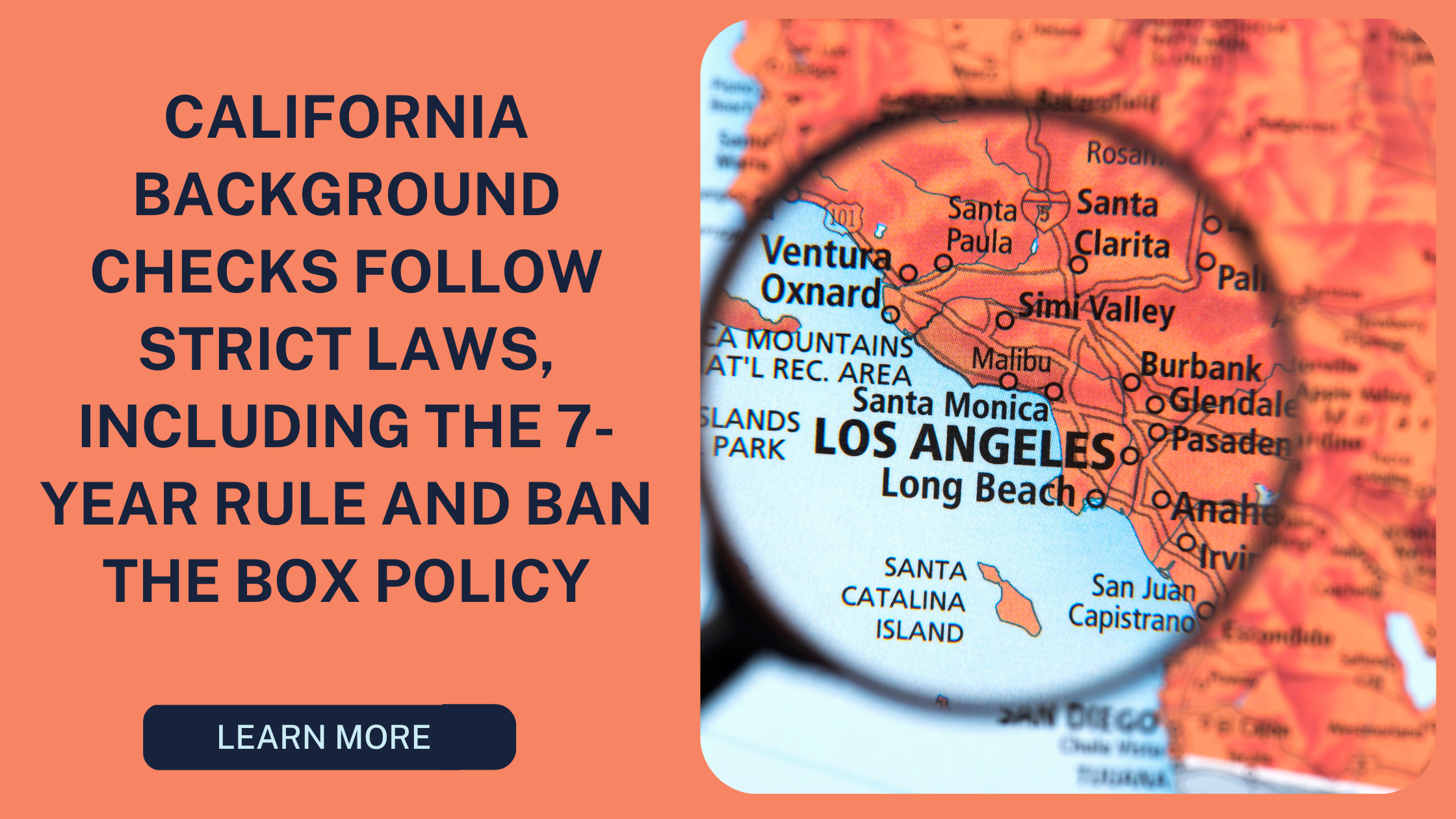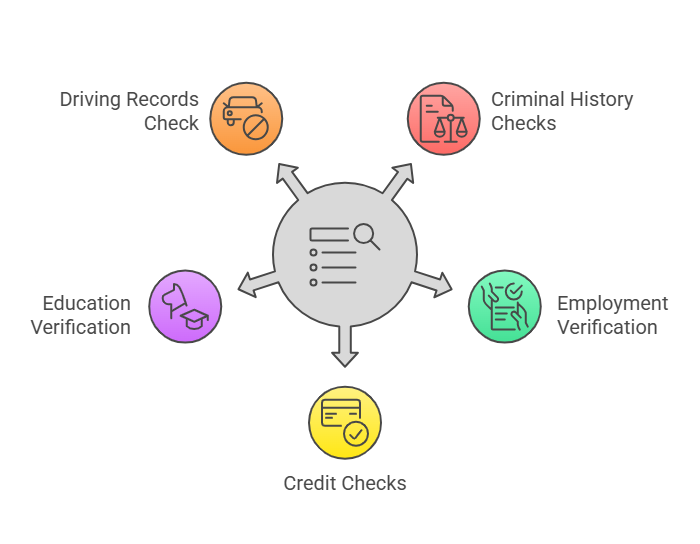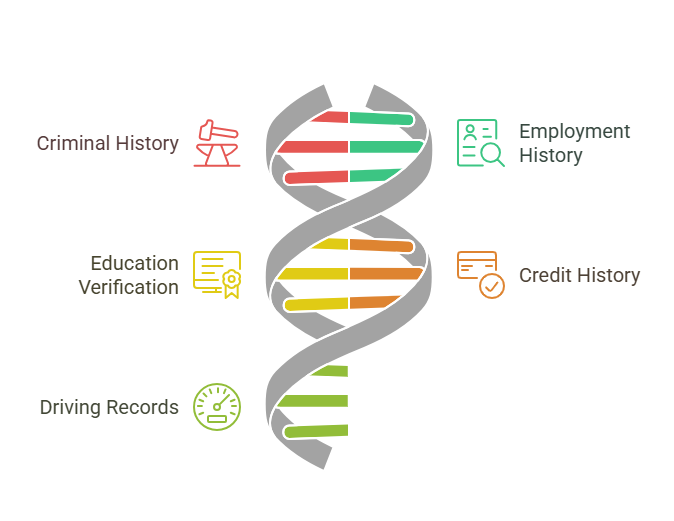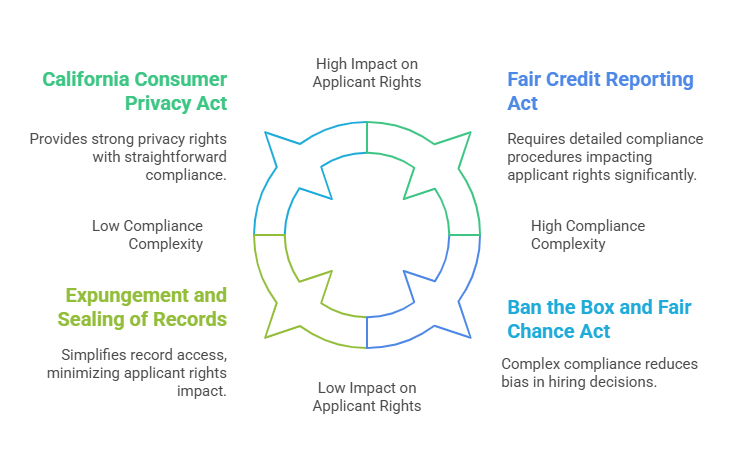
Understanding Background Checks in California: An Overview
Background checks in California are an essential part of the hiring process, providing employers with valuable insights into a candidate’s history. These checks help ensure that businesses hire qualified, trustworthy individuals while minimizing risks associated with hiring decisions. Whether it’s criminal history, employment verification, or credit checks, background checks offer a comprehensive look at a potential employee’s past, allowing employers to make informed hiring choices.
What is a Background Check?
A background check is a process where employers review various aspects of a candidate’s history to assess their suitability for a role. In California, background checks are governed by a mix of federal, state, and local laws designed to protect candidates’ rights while giving employers the information they need to make confident hiring decisions.
The types of background checks commonly conducted include:
- Criminal History Checks: These checks provide information about a candidate’s criminal record, including arrests, convictions, and other interactions with the law.
- Employment Verification: Employers may verify a candidate’s employment history, ensuring that the information provided matches records from previous employers.
- Credit Checks: Certain positions, especially in finance or management, may require a review of a candidate’s credit history to assess financial responsibility.
- Education Verification: Employers may check a candidate’s educational background to confirm the degrees, certifications, or diplomas they claim to have earned.
Employers use background checks to evaluate a candidate’s integrity, honesty, and suitability for the position. Background checks help protect the workplace, clients, and other employees from potential risks such as fraud, theft, or violence.
Why are Background Checks Important in California?
California, as one of the largest and most regulated states, has a unique set of laws that govern how background checks should be conducted. Employers must navigate these regulations carefully to ensure compliance with both state and federal law. Background checks are important for the following reasons:
- Ensuring Safety: Employers want to ensure that their workplace is safe and free from individuals with a history of violence or criminal behavior.
- Reducing Hiring Risks: By verifying a candidate’s history, employers can reduce the risk of making a bad hire. This could prevent workplace fraud, theft, or negligence.
- Protecting the Brand: Hiring employees with questionable backgrounds can negatively affect a company’s reputation. Employers may avoid hiring individuals who have been involved in serious crimes or fraud, especially when those individuals might harm the company’s public image.
- Compliance with Laws: California’s laws are strict when it comes to handling background checks, particularly regarding criminal history. Employers must ensure that their background check practices comply with these laws to avoid legal consequences.
Types of Background Checks in California
Background checks in California can be divided into several categories. Each type of check serves a different purpose and reveals different aspects of a candidate’s background. Let’s take a closer look at the most common types of background checks conducted in California:

1. Criminal History Checks
Criminal background checks are one of the most common and crucial components of any background check process. Employers use this check to evaluate whether a potential hire has any past criminal convictions. In California, employers must adhere to specific laws when reviewing criminal records, including restrictions on asking about criminal history before a conditional job offer has been made. This is known as “Ban the Box,” a law that prevents employers from asking about criminal convictions on job applications.
However, employers can check criminal history later in the hiring process. Employers are also prohibited from considering certain types of criminal records, such as arrests that didn’t lead to convictions or convictions that have been expunged.
2. Employment Verification
Employment verification checks are conducted to ensure that the information a candidate provides about their past jobs is accurate. Employers may contact previous employers to confirm job titles, dates of employment, and other details to verify the candidate’s qualifications and experience.
In California, employers should obtain written consent from candidates before contacting previous employers for verification. Additionally, employers should ensure they are not violating any privacy laws during this process.
3. Credit Checks
California has stringent rules regarding credit checks. Employers in the state can only conduct credit checks for specific job positions that involve financial responsibilities or access to sensitive information. These positions might include roles such as financial analysts, accountants, or senior managers.
California law prohibits employers from using credit checks as a basis for making hiring decisions in most other job categories. If a credit check is required for a specific position, the employer must notify the candidate and obtain written consent before the check is conducted.
4. Education Verification
Education verification checks are typically used by employers to confirm the candidate’s academic qualifications. This check ensures that the candidate has earned the degrees or certifications they claim to have. In California, employers may contact educational institutions directly or use third-party services to verify the details of a candidate’s academic record.
5. Driving Records Check
For jobs that require driving, employers may check a candidate’s driving record to assess their history behind the wheel. This is particularly important for jobs that involve transporting goods or driving company vehicles. California employers may check the candidate’s DMV records to look for any history of traffic violations or DUIs.
The Role of Background Checks in the Hiring Process
Background checks are a crucial tool for employers in California to make informed hiring decisions. When conducted properly, these checks can help businesses ensure they hire the right individuals for the job. By conducting thorough background checks, employers can:
- Verify the accuracy of the information provided by the candidate.
- Reduce the risk of hiring individuals who may have a history of violence, dishonesty, or other behaviors that could endanger the workplace or clients.
- Ensure compliance with California’s laws and regulations related to hiring practices.
However, it’s important to note that employers in California must follow strict legal guidelines when conducting background checks. In some cases, failing to comply with these regulations can result in legal consequences or lawsuits. Employers should be diligent in ensuring that their background check practices adhere to both federal and state laws.
Rapid Hire Solutions and Background Checks in California
Employers looking to streamline their background check processes in California can benefit from services like Rapid Hire Solutions. Rapid Hire Solutions helps businesses by providing comprehensive background check services that ensure compliance with California’s complex employment laws. They offer a wide range of checks, including criminal history, employment verification, and credit reports, all conducted with the utmost attention to legal compliance and privacy.
By working with RapidHireSolutions, businesses can ensure they are conducting background checks efficiently, accurately, and in full compliance with California law. This helps minimize the risk of hiring non-compliant candidates while promoting a safer and more trustworthy workplace.
What Does a Background Check Reveal in California? Key Insights
When an employer conducts a background check in California, they aim to gather comprehensive information about a candidate’s history. These checks are not only important for assessing the suitability of a candidate for a role, but they also help employers mitigate risks by confirming the information provided by the applicant and ensuring that it aligns with their qualifications, experiences, and behavior.
California has specific laws that govern the process, so it’s crucial for both employers and job seekers to understand what information can be revealed during a background check and how it may affect hiring decisions.
Types of Information Revealed in a Background Check in California
California background checks can reveal several important pieces of information that help employers decide whether a candidate is fit for a role. Some of the most common aspects of a background check include:

1. Criminal History
Criminal history is one of the most significant factors employers assess when reviewing a candidate’s background. California employers use criminal background checks to ensure that applicants do not have a history of criminal activity that would make them unsuitable for the position.
The information revealed during a criminal history check may include:
- Arrests: This includes any record of an arrest, even if it did not result in a conviction. However, employers in California are restricted from considering arrests that did not lead to a conviction unless the individual is currently under arrest or the arrest is directly related to the position.
- Convictions: If a person has been convicted of a crime, the details of the conviction will appear in a background check. Employers may consider convictions when evaluating a candidate’s suitability for a job, but they must follow the guidelines set forth by California law. In California, the consideration of a conviction must be relevant to the job position being applied for.
- Expunged or Sealed Records: In California, certain criminal records can be expunged or sealed, meaning they will not appear on a background check. Expungement is a legal process that allows a person to petition to have their criminal record removed or hidden from public view. Expunged records are not accessible during background checks for most employers, though they may still be revealed in some situations, such as applying for government jobs.
Ban the Box: California has implemented the “Ban the Box” law, which prohibits employers from asking about an applicant’s criminal history until a conditional job offer is made. This rule is intended to give applicants with a criminal record a fairer chance at securing employment.
2. Employment History
Employment history checks verify the candidate’s past job roles, dates of employment, job titles, and responsibilities. Employers use this information to confirm that the individual has the required experience for the job and that they have been truthful about their qualifications.
What employment verification checks reveal:
- Job Titles: This confirms whether the applicant held the job titles they claim and ensures that the titles match what is listed in their resumes or applications.
- Employment Dates: Employers will verify the dates of employment to ensure there are no gaps in employment or discrepancies regarding the length of time the candidate worked for a previous employer.
- Job Responsibilities: Employers may contact past employers to verify whether the job responsibilities the candidate described align with what was actually carried out.
California employers must ensure they are in compliance with the Fair Credit Reporting Act (FCRA), which outlines how and when employment history checks should be conducted, including obtaining permission from the applicant before contacting past employers.
3. Education Verification
Education verification confirms whether a candidate has the qualifications they claim, including degrees, certifications, and diplomas. Education verification checks ensure that an applicant has earned the necessary academic credentials to meet the requirements of the job.
What education verification reveals:
- Degrees or Certifications: Employers can verify the degree level or certifications listed on the resume. For example, if a candidate claims to have a bachelor’s degree, the employer will check with the educational institution to confirm that this degree was awarded.
- Institution Names: Employers will confirm that the candidate attended the institution they claim to have attended and verify the dates of attendance.
- Majors and Graduation Dates: Employers will verify whether the candidate graduated from the institution, and they may also confirm the major or program of study.
It’s important to note that education verification checks are generally only conducted if the position requires specific academic qualifications, such as a certain degree level or certification.
4. Credit History
In California, employers may conduct credit checks for certain roles, particularly those that involve financial responsibilities. Credit checks are most commonly used in industries such as banking, finance, and management positions. The information revealed in a credit report can provide insight into a person’s financial history and their ability to handle financial responsibilities.
What credit history checks reveal:
- Credit Score: Employers may review a candidate’s credit score to gauge their financial health and responsibility. However, California law restricts employers from using a candidate’s credit score as a basis for employment decisions, except in cases where the position involves significant financial responsibilities.
- Debt History: Employers can see the candidate’s credit history, including outstanding debts, loans, bankruptcies, and payment delinquencies. These factors can give employers an understanding of the applicant’s financial reliability.
- Credit Inquiries: Employers may see if a candidate has been applying for multiple lines of credit, which could signal potential financial instability.
In California, employers must notify candidates if they plan to conduct a credit check and receive written consent before proceeding.
5. Driving Records
If the job requires driving as part of the duties, a driving record check is essential. This check reveals information about a candidate’s history on the road, such as any traffic violations, accidents, or suspensions. California employers may request this check if the position involves operating company vehicles or driving as a primary job function.
What driving record checks reveal:
- Traffic Violations: Employers can see a record of any traffic violations, such as speeding tickets, running red lights, or other infractions.
- Accidents: If the candidate has been involved in accidents, these may appear on the record.
- License Status: Employers can verify that the candidate holds a valid driver’s license and check for any suspensions or restrictions.
California employers must follow strict guidelines when reviewing driving records, and candidates have the right to dispute any inaccurate or incomplete information.
California-Specific Laws Regarding Background Checks
California has robust laws regulating how background checks are conducted, particularly in regard to criminal history. These laws ensure that background checks are conducted in a fair and non-discriminatory manner. The Ban the Box law, for example, prohibits employers from asking about criminal history until a conditional job offer is made. Additionally, employers cannot use criminal convictions as an automatic disqualifier; the conviction must be job-related and have a direct bearing on the candidate’s ability to perform the role.
Other relevant California laws include:
- California Consumer Privacy Act (CCPA): This act gives individuals the right to request access to their personal data, including information revealed in background checks.
- Fair Employment and Housing Act (FEHA): This act provides protection against discrimination in employment, including for individuals with criminal records, provided the conviction does not relate directly to the job.
How Rapid Hire Solutions Supports Employers in California
For employers in California, conducting background checks can be complicated due to the various laws and regulations in place. RapidHireSolutions provides a seamless solution for businesses to ensure compliance while conducting comprehensive and thorough background checks. Their services include criminal history checks, employment verification, credit checks, and more, all in accordance with California’s legal requirements.
With Rapid Hire Solutions, employers can trust that their background checks will be conducted efficiently, accurately, and legally, helping businesses avoid costly legal mistakes and hire the most qualified candidates.
Table: Summary of Key Components of a California Background Check
| Component | What it Reveals | California-Specific Considerations |
|---|---|---|
| Criminal History | Arrests, convictions, expungements, and sealed records | Ban the Box, conviction relevance to job, expungement eligibility |
| Employment History | Job titles, dates of employment, responsibilities | Written consent required, verification of past employment |
| Education Verification | Degrees, certifications, institutions, attendance dates | Verification of claims for positions requiring academic credentials |
| Credit History | Credit score, debt history, bankruptcies, credit inquiries | Limited use for financial positions, written consent required |
| Driving Records | Traffic violations, accidents, license status | Relevant for jobs requiring driving, candidate’s right to dispute errors |
This detailed breakdown reveals how California’s specific laws shape background checks and why employers must be diligent in their approach.

